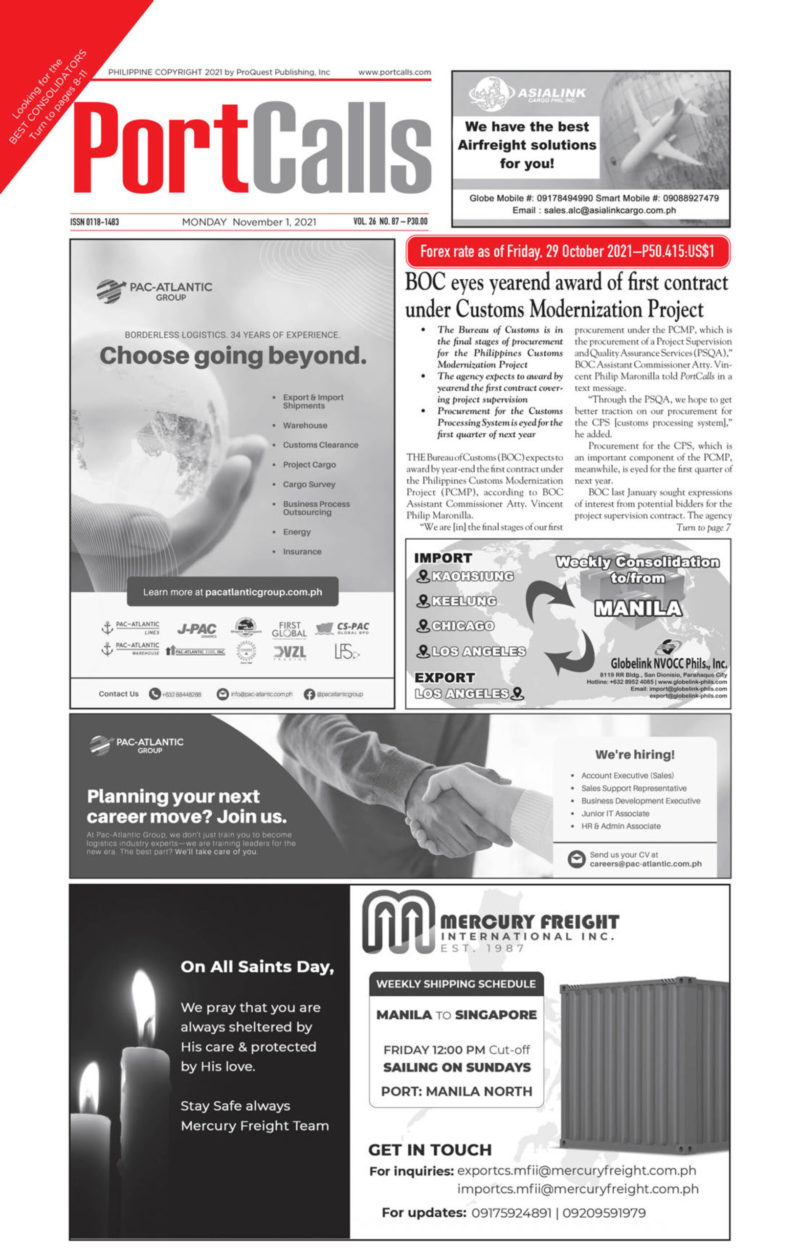- The Export Development Council supports a draft executive order removing the Philippine Ports Authority’s share in ports’ cargo-handling revenues
- The draft EO said provisions of an old policy constitute “conflict of interest”, with PPA both as port developer and regulator
- PPA “benefits from its own regulation”, giving it “incentive to increase the rate to improve its financial health”, the draft EO said
- The PPA has “regularly and reliably increased” cargo-handling charges it allows port operators to impose, EDC noted
- It added PPA “touts its collections as an achievement, ignoring the impact that its regulatory might has on local industry”
- The approval of the proposed EO is “a small step” in supporting local manufacturers, EDC said
The Export Development Council (EDC) is supporting a draft executive order (EO) that seeks to remove the government’s share in cargo-handling revenues.
The draft EO will revoke Letter of Instructions (LOI) 1005-A, signed in April 1980, by deleting Instruction Nos. 3 and 4, thus removing the Philippine Ports Authority (PPA)’s share in ports’ cargo-handling revenues.
In a letter dated October 26 to Transportation Secretary Arthur Tugade, who is also the PPA Board chairman, and PPA general manager Jay Daniel Santiago, the EDC-Networking Committee on Legislative Advocacy and Monitoring (EDC-NCLAM) said the passage of the proposed EO “is a small step in the direction of supporting our local manufacturers.” The letter was signed by Oscar Barrera, chair of EDC-NCLAM.
EDC-NCLAM took note of the “time of acute suffering for exporters whose operations have been most heavily affected by the COVID-19 pandemic.”
It noted PPA has “regularly and reliably increased” cargo-handling charges it allows port operators to impose. The agency also “touts its collections as an achievement, ignoring the impact that its regulatory might has on local industry.”
The draft EO said both Instruction Nos. 3 and 4 constitute a “conflict of interest” as the regulator “now benefits from its own regulation, and hence provides the regulator, herein Philippine Ports Authority (PPA), the incentive to increase the rate to improve its financial health.”
PPA is vested with both regulatory and commercial functions and is entitled, under LOI 1005-A, to a share in cargo-handling revenues. In particular under Instruction No. 3, government earns at least 10% from all cargo-handling contractors and port-related service operators’ gross income earned from such services.
The arrangement is meant to “intensify the collection of all port charges including the government share from all cargo-handling contractors and port-related service operators, all back accounts, in order for them to share the burden of the accelerated development, construction and maintenance of the government facilities they utilize.”
Several industry stakeholders and business groups have for years called for the separation of PPA’s functions, citing conflict of interest and saying exercising both functions increase logistics costs.
The EDC and Philippine Chamber of Commerce and Industry in 2016 included the repeal of LOI 1005-A in its list of proposed priority actions for DOTr. In 2017, EDC issued Resolution No. 3, which endorsed the repeal of the policy LOI due to conflict of interest.
Also calling for such separation are the National Logistics Master Plan of the Department of Trade and Industry; private-sector led Philippine Multimodal Transport and Logistics Roadmap; and state-owned think tank Philippine Institute for Development Studies’ discussion paper titled “Regulatory Measures Affecting Services Trade and Investment: Distribution, Multimodal Transport, and Logistics Services” and policy noted titled “Regulatory Challenges of the Philippine Logistics Industry.”
The PIDS discussion paper said: “This anomalous arrangement under which the regulator is also partly responsible for port operation and management has resulted in the formulation and implementation of policies and regulations that are detrimental to the welfare of the transport and logistics service providers and users, and thus to the nation’s international competitiveness.”
READ: OECD proposes changes to boost PH logistics sector
The Organisation for Economic Co-operation and Development and Philippine Competition Commission also recommended pro-competition actions/measures to boost the country’s logistics sector and level the playing field between private and state-owned firms, including separation of operational, regulatory, and commercial functions of port authorities.
The recommendation is contained in the report “Competition Assessment Reviews: Logistics Sector in the Philippines” launched virtually on January 29, 2021. – Roumina Pablo









